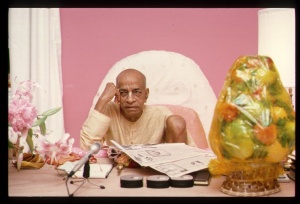SB 4.5.24: Difference between revisions
m (1 revision(s)) |
No edit summary |
||
| Line 1: | Line 1: | ||
{{info | {{info | ||
|speaker=Maitreya | |speaker=Maitreya Ṛṣi | ||
|listener=Vidura | |listener=Vidura | ||
}} | }} | ||
[[Category:Srimad-Bhagavatam - Canto 04 Chapter 05]] | |||
[[Category:Bhagavatam Verses Spoken by Maitreya Rsi - Vanisource|040524]] | |||
<div style="float:left">'''[[Srimad-Bhagavatam]] - [[SB 4|Fourth Canto]] - [[SB 4.5: Frustration of the Sacrifice of Daksa|Chapter 5: Frustration of the Sacrifice of Dakṣa]]'''</div> | |||
<div style="float:right">[[File:Go-previous.png|link=SB 4.5.23]] '''[[SB 4.5.23]] - [[SB 4.5.25]]''' [[File:Go-next.png|link=SB 4.5.25]]</div> | |||
{{RandomImage}} | |||
==== TEXT 24 ==== | ==== TEXT 24 ==== | ||
<div | <div class="verse"> | ||
dṛṣṭvā saṁjñapanaṁ yogaṁ | :dṛṣṭvā saṁjñapanaṁ yogaṁ | ||
paśūnāṁ sa patir makhe | :paśūnāṁ sa patir makhe | ||
yajamāna-paśoḥ kasya | :yajamāna-paśoḥ kasya | ||
kāyāt tenāharac chiraḥ | :kāyāt tenāharac chiraḥ | ||
</div> | </div> | ||
| Line 16: | Line 22: | ||
==== SYNONYMS ==== | ==== SYNONYMS ==== | ||
<div | <div class="synonyms"> | ||
''dṛṣṭvā''—having seen; ''saṁjñapanam''—for the killing of the animals in the sacrifice; ''yogam''—the device; ''paśūnām''—of the animals; ''saḥ''—he (Vīrabhadra); ''patiḥ''—the lord; ''makhe''—in the sacrifice; ''yajamāna-paśoḥ''—who was an animal in the form of the chief of the sacrifice; ''kasya''—of Dakṣa; ''kāyāt''—from the body; ''tena''—by that (device); ''aharat''—severed; ''śiraḥ''—his head. | |||
</div> | </div> | ||
| Line 23: | Line 29: | ||
==== TRANSLATION ==== | ==== TRANSLATION ==== | ||
<div | <div class="translation"> | ||
Then Vīrabhadra saw the wooden device in the sacrificial arena by which the animals were to have been killed. He took the opportunity of this facility to behead Dakṣa. | Then Vīrabhadra saw the wooden device in the sacrificial arena by which the animals were to have been killed. He took the opportunity of this facility to behead Dakṣa. | ||
</div> | </div> | ||
| Line 30: | Line 36: | ||
==== PURPORT ==== | ==== PURPORT ==== | ||
<div | <div class="purport"> | ||
In this connection it is to be noted that the device used for killing animals in the sacrifice was not designed to facilitate eating their flesh. The killing was specifically intended to give a new life to the sacrificed animal by the power of Vedic mantra. The animals were sacrificed to test the strength of Vedic mantras; yajñas were performed as a test of the mantra. Even in the modern age, tests are executed on animal bodies in the physiology laboratory. Similarly, whether or not the brāhmaṇas were uttering the Vedic hymns correctly was tested by sacrifice in the arena. On the whole, the animals thus sacrificed were not at all the losers. Some old animals would be sacrificed, but in exchange for their old bodies they received other, new bodies. That was the test of Vedic mantras. Vīrabhadra, instead of sacrificing animals with the wooden device, immediately beheaded Dakṣa, to the astonishment of everyone. | In this connection it is to be noted that the device used for killing animals in the sacrifice was not designed to facilitate eating their flesh. The killing was specifically intended to give a new life to the sacrificed animal by the power of Vedic ''mantra''. The animals were sacrificed to test the strength of Vedic ''mantras''; ''yajñas'' were performed as a test of the ''mantra.'' Even in the modern age, tests are executed on animal bodies in the physiology laboratory. Similarly, whether or not the ''brāhmaṇas'' were uttering the Vedic hymns correctly was tested by sacrifice in the arena. On the whole, the animals thus sacrificed were not at all the losers. Some old animals would be sacrificed, but in exchange for their old bodies they received other, new bodies. That was the test of Vedic ''mantras''. Vīrabhadra, instead of sacrificing animals with the wooden device, immediately beheaded Dakṣa, to the astonishment of everyone. | ||
</div> | </div> | ||
__NOTOC__ | |||
<div style="float:right; clear:both;">[[File:Go-previous.png|link=SB 4.5.23]] '''[[SB 4.5.23]] - [[SB 4.5.25]]''' [[File:Go-next.png|link=SB 4.5.25]]</div> | |||
__NOTOC__ | |||
__NOEDITSECTION__ | |||
Revision as of 12:14, 7 May 2021

A.C. Bhaktivedanta Swami Prabhupada
TEXT 24
- dṛṣṭvā saṁjñapanaṁ yogaṁ
- paśūnāṁ sa patir makhe
- yajamāna-paśoḥ kasya
- kāyāt tenāharac chiraḥ
SYNONYMS
dṛṣṭvā—having seen; saṁjñapanam—for the killing of the animals in the sacrifice; yogam—the device; paśūnām—of the animals; saḥ—he (Vīrabhadra); patiḥ—the lord; makhe—in the sacrifice; yajamāna-paśoḥ—who was an animal in the form of the chief of the sacrifice; kasya—of Dakṣa; kāyāt—from the body; tena—by that (device); aharat—severed; śiraḥ—his head.
TRANSLATION
Then Vīrabhadra saw the wooden device in the sacrificial arena by which the animals were to have been killed. He took the opportunity of this facility to behead Dakṣa.
PURPORT
In this connection it is to be noted that the device used for killing animals in the sacrifice was not designed to facilitate eating their flesh. The killing was specifically intended to give a new life to the sacrificed animal by the power of Vedic mantra. The animals were sacrificed to test the strength of Vedic mantras; yajñas were performed as a test of the mantra. Even in the modern age, tests are executed on animal bodies in the physiology laboratory. Similarly, whether or not the brāhmaṇas were uttering the Vedic hymns correctly was tested by sacrifice in the arena. On the whole, the animals thus sacrificed were not at all the losers. Some old animals would be sacrificed, but in exchange for their old bodies they received other, new bodies. That was the test of Vedic mantras. Vīrabhadra, instead of sacrificing animals with the wooden device, immediately beheaded Dakṣa, to the astonishment of everyone.